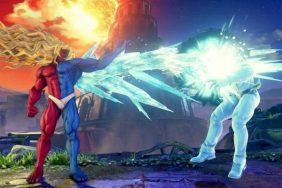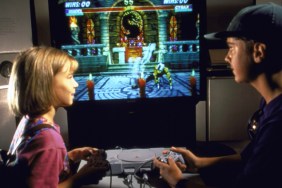From the perspective of someone who isn’t much interested in self-promotion or launching myself into a heated debate with anonymous Twitter accounts over the Internet, the past two years have been pretty interesting to witness from the sidelines. Though an anti-progressive agenda existed in the community surrounding gaming prior to the existence of GamerGate, it was only until that group’s creation that clear lines were drawn in the sand, and people began defining those with opposing opinions as their perceived “enemies,” despite this – as with most debates surrounding gaming – being an ongoing argument taking place almost entirely between relative strangers across the Internet.
Video games are evolving to suit the needs of an expanding audience, with the medium experiencing growing pains during this process similar to those experienced by film and TV. As developers continue to adapt in order to increase the representation of people of different gender, ethnicity and sexual orientation to the de-facto heterosexual white male protagonist, there is an increased amount of pushing and pulling between supporters and detractors of these advancements. While GamerGate initially branded itself as a consumer movement pushing for ethics in video game journalism, it’s never really been about that – the group’s targets continue to consist almost entirely of people who they feel are pushing their own progressive agenda, the “SJWs,” and their perceived continued battle to rid gaming of sex, violence and the aforementioned straight white guy.
I’ve always been interested in listening to and trying to understand the reasoning behind opinions and ideologies that differ from my own, which is why I continue to find GamerGate an intriguing topic. Delving into the often hivemind-esque mentality and absolutism of some of the group’s most prominent figureheads reveals that it’s understandable why so many believe the things that they do. I get why these people feel that there’s a push for sex outright being removed from gaming, but I think these beliefs are a result of both misinformation and hysteria.
The most prominent opinion held by members of GG regarding so-called SJWs is that they hope to see sex removed from video games altogether. This is an interesting thought process on behalf of GamerGate, in that it highlights just how easy it is to make a logical leap from “they don’t agree with how sex is depicted in this video game,” to “they must therefore want sex banned from all video games.” I’m writing this as a result of an article posted by NicheGamer, a site which gets a lot of love from GamerGate followers. The article, titled ‘Sex-Negative Beliefs Are Ruining Gaming, and Society at Large,’ expands upon the thought process that those who consider themselves to be anti-GamerGate (or “Anti-GGers” as they’re commonly referred to as) want sex banished from video games, because of their own negative attitudes towards it.
Here’s an excerpt from the piece:
“Here in the late days of 2015 as I write this editorial, we live in a time where the aforementioned attitudes and images are considered unhealthy and contribute to kids growing up to be violent, misogynistic rapists. We’re told by people who get paid hundreds of thousands of dollars through their patreon accounts (or private donations) to make videos that have the same production values of a 5th grade AV club’s project to avoid anything remotely sexual for fear that it will make us devalue women and forget that they are human beings. It will, according to them, cause the viewer of such puerile trash to see women as objects and lead to domestic violence and sexual assault.”

This kind of belief stems from a number of topics of debate that have occurred over the past year or so, each involving controversies surrounding video games that emphasized the sexuality of their female characters. Games such as Dragon’s Crown, an RPG which featured hilariously oversized breasts on the majority of its female characters, or Xenoblade Chronicles X, which had the option to customize the size of its player-character’s boobs removed from its English version due to said character being an underage girl. The criticisms that had been leveled at these two games were then misconstrued as evidence that detractors must therefore want sex removed from video games, and not the more likely argument that perhaps these people just want sex in their video games represented differently than it has been since the ’90s.
NicheGamer doesn’t give any actual evidence to support the claim that “SJWs are sex-negative” in their article, but rather litters it with a selection of images taken from games that each feature sexualized women, from Dead or Alive Xtreme 3, through to Bayonetta 2 and Metal Gear Solid V: The Phantom Pain. There is therefore the suggestion that these games and the criticisms that have been leveled at them are indicative of the supposed sex-negative attitude from GamerGate’s opponents, despite them instead representing specific incidents in which some gamers have questioned the portrayal of the female characters in these individual games.
According to this argument, you’re sex-negative if you question the representation of women in video games whatsoever. Say, for instance, that weird scene in MGSV where Quiet rolls around in the rain and the camera is shoved right up the crack of her ass while she’s doing so; apparently if you criticize the choice to make this otherwise strong character an object to leer over, you’re actually damaging the industry, not just adding an opinion into an already mighty sea of opinions about the game. But sex isn’t big-breasted women rolling around in puddles, nor is it abnormally-boobed female sorceresses casting spells whilst struggling to keep a hold of her cleavage, and so an individual criticizing these things being included in video games isn’t an example of them trying to ban sex from the medium, but rather of them questioning the portrayal of these female characters.

I’m responding to NicheGamer’s article because this is an opinion that is being echoed on a much wider scale, and is far too frequently being utilized in an attempt to shut down any arguments regarding the representation of women in video games. Gaming’s audience is forever broadening, and as such it makes sense for developers to make their games more inclusive and attractive to people outside of the boys-only demographic that they once almost solely appealed to. I do not believe that those who enjoy playing games such as Dragon’s Crown are therefore misogynists for doing so, but why should its overtly sexualized art style be exempt from criticism? What good argument is there against some speaking out against Quiet’s portrayal? Some of the same people who argue against these criticisms being made are also those who lambasted Dragon Age: Inquisition for its supposed “shoehorned” representation of homosexual relationships, and that game featured actual sex between its characters, not just voyeuristic titillation as a result of a selection of scantily-clad women. Does this mean DA:I‘s detractors are sex-negative, too?
I think the reasoning behind this mindset is a fear of change. As gaming continues to grow so to does its audience, which inevitably leads to more diverse critique from people of various different backgrounds. While one critic may focus upon the intricacies of a game’s PC options a la prominent YouTuber TotalBiscuit, another may instead choose to focus upon a game’s narrative and the portrayal of its characters. Or you may stumble upon a critic who prefers to detail both. There are so many people playing video games right now that there are a nigh-on infinite amount of opinions you can uncover for each new release via the Internet, some of which you’ll agree with and some you won’t. But those who suggest that criticism automatically goes hand-in-hand with censorship are being insincere at best, and plain idiotic at worst.
Sex deserves a place in video games, much like it has its place in film and TV. But as is also the case in film and TV, sexual content featured in games should not – and will not – bypass criticism altogether. This continued suggestion that gamers should not cast a critical eye over a game’s sexual themes nor the depiction of its characters like they would, say, its gameplay or visuals, suggests that we should continue to judge each new release as though we were looking at a new 8-bit NES game, forgetting the past few decades of advancements made in the medium and the increasingly mature stories being told within it. Trying to fight against games being allowed the same kind of thoughtful critique as is experienced in any other entertainment medium significantly undermines the stories developers are telling and the characters they are creating, as it suggests that video games are not worthy of being subjected to an opinion regarding anything outside of their gameplay and visuals. Video games are much more than that – let’s not treat them like they aren’t.








